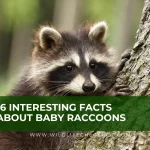Do Raccoons Hibernate? Raccoons Winter Behavior Explained

Some animals undergo hibernation and experience an extended period of sleep lasting throughout most of the winter. During this hibernation period, their body temperature is lowered, and their breathing and heart rate slow down. The conservation of energy is facilitated by the animals that hibernate.
The primary motivation for these animals to hibernate is the lack of available food, and they remain in a state of hibernation until food becomes accessible once more. The duration of hibernation varies depending on the particular animal, climate, and various other factors.
Raccoons are the type of animals that are always active all year, and we can say Raccoons don’t hibernate. Raccoons don’t experience a true form of hibernation but always enter a prolonged inactivity called Torpor.
During this torpor period, raccoons slow their metabolism, and in their dens, they fall asleep, using their tails to wrap around their body for warmth. Torpor only does last for a few weeks.
But at what temperature do Raccoons hibernate? This always happens when the temperature drops below 15 oF; this creature can sleep for weeks during this Torpor period and relies on the fat stores for food.
Unlike true hibernators, raccoons cannot depend on Torpor to carry them through winter. Instead, they must be woken up every few weeks to search for food, regain body heat, and drink. If the raccoons do not replenish their fat reserves quickly, about 50% of their body weight could be lost during winter.
Contents
How Do Raccoons Hibernate In Winter?
As we have established in the above heading, Raccoons don’t hibernate; they have some behavioral adaptations during winter. They ensure that before the winter sets in, they eat as much food as possible to help them accumulate more fat. Also, as they accumulate fat, their coats get thicker, which will help them fight the cold weather.
Raccoons are known to have thick coats, nimble hands, and also a clever mind. These creatures are resourceful and quickly adapt to any style of living, including urban area living. They must always prepare for every seasonal change, especially the winter because they find it hard to scavenge for food.

If other animals hibernate, they have an internal trigger called Hibernation Induction Trigger, activated by environmental changes. Let us take, for instance, they can have fewer daylight hours, and their temperatures drop. So as some animals prepare to hibernate during the winter, the raccoons get set for Torpor or a semi-hibernation.
What Do Raccoons Eat during Winter?
Part of the adaptability of Raccoons during winter is what they eat; since they don’t hibernate and only enter a state of Torpor, they need something to feed on.
Raccoons are omnivores, which means they can feed on plants, animals, eggs, human garbage, and insects. Because they have variability in their diet, they find much help in the winter, when food is scarce.
In winter, Raccoons feed on corn, fruit, insects, acorns, small animals, and injured waterfowl but also eat other available things.
Do Raccoons Hibernate Like Bears?
These animals look for ways to survive during winter when food and water are scarce. These are the adaptive behavior that happens to some animals to fight the winter; some will either hibernate or migrate. Bear does not hibernate; it only enters a state of sleep called Torpor, a semi-hibernation.
This is the same lifestyle adopted by Raccoons, so, in other words, we can say Raccoons Torpor like Bears and do not hibernate like Bears because none of them is a hibernator.
Should I Be Worried If I See Raccoons In My House During Winter?
Your worries will only come once a year because Raccoons will only find their way to yards during winter. Some Raccoons stay back in their dens during this period, especially the ones that have stored up body fat during the spring and summertime.
Since they are less inclined to change dens when it is cold, there is a probability you should be worried about having Raccoons around your house.
They always come to rummage your house for food or den items. You may also start noticing that your crops are missing from the garden or your chickens are missing from the house.

They damage insulation, drywall, wood beams, and even pipes. They can also damage wirings and create fire hazards by plugging pipes and ducts.
Also, these creatures find a way to create a toilet space to deposit their feces and urine. They can create stains on your walls and ceilings, and above all, they have a foul odor which indicates they are present.
Raccoons are not silent animals; they make different noises that can be mistaken for other wildlife animals. For instance, they can screech like an owl, bark, growl like a dog, chirp like a bird, and even hiss like a cat.
You will hear when they are stomping and even shuffling, all sounding like a human walk. You can see many reasons why you must be worried if Raccoons have invaded your house.
How To Get Rid Of Raccoons From My House During Winter?
You must know that Raccoons tend to turn over garbage cans and dig up different lawns for grubs. This is a sensitive time to track them down in your yards and house so they don’t start raising new offspring. So how can you get rid of Raccoons from your house?
No one will advise you to get rid of Raccoons in your house by yourself because they are known for carrying rabies among wild animals. This means the presence of these creatures should make you worry and find a way to prevent yourself from the infection.
If the Raccoons feel you want to attack them, they don’t mind attacking back, so you have to get wildlife experts to help you remove them from your house. Their droppings are known to contain some parasites which are dangerous if touched.
Therefore, it is advisable to leave getting rid of Raccoons to trained professionals. Their body can host a variety of ticks, fleas, and other insects, which you won’t want to have contact with. So, the best way to get rid of Raccoons from your house or yard is to call for the services of wildlife animal professionals.
If you are asked the question, do raccoons hibernate? Then you should be able to answer that it is a No. They only participate in half or untrue hibernation, which is called Torpor.
Never forget that this part of their lives always happens during winter, so you should also be ready to host some of them in your yards. You can always have a way to get rid of them from your house.




